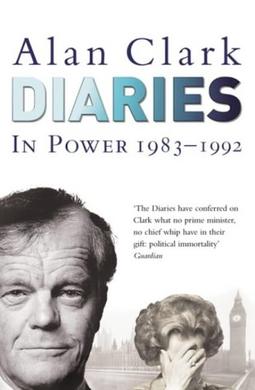Alan Clark facts for kids
Quick facts for kids
Alan Clark
|
|
|---|---|

Clark appearing on Opinions in 1993
|
|
| Minister of State for Defence Procurement | |
| In office 25 July 1989 – 14 April 1992 |
|
| Prime Minister | |
| Preceded by | The Lord Trefgarne |
| Succeeded by | Jonathan Aitken |
| Minister of State for Trade | |
| In office 24 January 1986 – 24 July 1989 |
|
| Prime Minister | Margaret Thatcher |
| Preceded by | Paul Channon |
| Succeeded by | The Lord Trefgarne |
| Parliamentary Under-Secretary of State for Employment | |
| In office 13 June 1983 – 24 January 1986 |
|
| Prime Minister | Margaret Thatcher |
| Preceded by | Peter Morrison |
| Succeeded by | Ian Lang |
| Member of Parliament for Kensington and Chelsea |
|
| In office 1 May 1997 – 5 September 1999 |
|
| Preceded by | Constituency Created |
| Succeeded by | Michael Portillo |
| Member of Parliament for Plymouth Sutton |
|
| In office 28 February 1974 – 16 March 1992 |
|
| Preceded by | David Owen |
| Succeeded by | Gary Streeter |
| Personal details | |
| Born |
Alan Kenneth Mackenzie Clark
13 April 1928 London, England |
| Died | 5 September 1999 (aged 71) Saltwood, England |
| Political party | Conservative |
| Spouse |
(Caroline) Jane Beuttler
(m. 1958) |
| Children | 2 |
| Parents |
|
| Relatives | Colin Clark (brother) |
| Alma mater | Christ Church, Oxford |
Alan Kenneth Mackenzie Clark (born 13 April 1928 – died 5 September 1999) was a British politician, author, and diarist. He was a member of the Conservative Party and served as a Member of Parliament (MP). An MP is a person elected to represent a group of voters in the House of Commons.
Clark worked as a junior minister in the governments led by Margaret Thatcher. He held roles in departments dealing with employment, trade, and defence. He was also known for his strong support of animal rights. His published diaries give a detailed look into political life during Thatcher's time as Prime Minister.
Contents
Early Life and Education
Alan Clark was born in London on 13 April 1928. His father, Kenneth Clark, was a famous art historian. Alan had a sister and a brother.
He attended several schools, including Egerton House and St Cyprian's School. Later, he went to Eton College, a well-known boarding school. After Eton, he studied Modern History at Christ Church, Oxford university. After university, he wrote articles about cars before studying to become a lawyer. He was officially allowed to practice law in 1955 but chose not to. Instead, he focused on studying military history to become a writer.
Writing Military History
Clark's first book, The Donkeys, was published in 1961. It was about the British army's campaigns at the start of the First World War. The book looked at battles on the Western Front in 1915. It also discussed how commanders like Sir John French and Douglas Haig managed the war.
The book's title came from the saying "Lions led by donkeys". This phrase suggests that brave soldiers were led by poor commanders. The Donkeys became an important book about Britain's experience in the First World War. Many historians have discussed his work, some praising its writing and others questioning its historical accuracy.
Clark wrote other military history books, including Barbarossa in 1965, which looked at a major offensive in the Second World War. However, none of his later books became as famous as The Donkeys. In the mid-1970s, he decided to focus on a career in national politics.
Political Career
Alan Clark first became involved in politics because he was against Britain joining the Common Market (which later became the European Union). He joined the Conservative Monday Club in 1968.
He was elected as an MP for Plymouth Sutton in February 1974. At this time, Harold Wilson became Prime Minister. Clark spent his first five years in Parliament as part of the Conservative opposition.
Although Margaret Thatcher liked him, Clark was never promoted to a top government position. He remained in mid-level minister roles during the 1980s.
Early Government Roles
In 1983, Clark became a junior minister at the Department of Employment. Here, he helped approve rules about equal pay.
In 1986, he was promoted to Minister of State for Trade at the Department of Trade and Industry. Later, in 1989, he became the Minister for Defence Procurement at the Ministry of Defence.
Leaving and Returning to Parliament
Clark left Parliament in 1992 after Margaret Thatcher was no longer Prime Minister. He later decided to return to politics. He was elected as the MP for Kensington and Chelsea in the 1997 election.
Clark had strong opinions on many subjects. He supported British unionism (keeping the United Kingdom together) and was against Britain being too closely linked with Europe (Euroscepticism). He was also a passionate supporter of animal rights. He joined protests against the live export of animals and supported animal rights activists.
After his death in 1999, many politicians spoke about Clark. Prime Minister Tony Blair described him as "extraordinary, amusing, irreverent, but with real conviction and belief."
His Famous Diaries
Clark kept a regular diary from 1955 until shortly before his death in 1999. His wife, Jane, wrote about his final month. The diaries from 1983 to 1992 were published after he left Parliament. These books, known as Diaries (or later In Power), are seen as an important record of how Margaret Thatcher's time as Prime Minister ended.
His diaries gave readers a peek into the lives of senior Conservative politicians. Two more volumes of his diaries were published later. One covered his early political career from 1972 to 1983, titled Diaries: Into Politics. The final volume, published in 2002, covered his decision to leave Parliament in 1992, his return, and his final days.
The diaries also show Clark's love for his chalet in Zermatt, his Scottish estate at Eriboll, and his home, Saltwood Castle. He also wrote about his interest in classic cars and the game of backgammon.
In 2004, the BBC made a TV series called The Alan Clark Diaries based on his books, with John Hurt playing Alan Clark.
Personal Life
In 1958, Alan Clark married Caroline Jane Beuttler. They were married for 41 years and had two sons:
- James Alasdair Kenneth Clark (born 1960, died 2019)
- Andrew McKenzie Clark (born 1962)
His elder son, James, passed away in 2019.
Death
Alan Clark died at his home, Saltwood Castle, on 5 September 1999, at the age of 71. He had been suffering from a brain tumour. He was buried in the grounds of the castle. His family shared that Clark wanted it to be known that he had "gone to join Tom and the other dogs."
Media Appearances
In 1993, Clark gave a televised lecture called Opinions for Channel 4. He later presented a four-part BBC series in 1997 called Alan Clark's History of the Tory Party.
The BBC TV series The Alan Clark Diaries in 2004 brought his name back into the news. An official book about Alan Clark, written by Ion Trewin, was published in 2009.
See Also
- List of animal rights advocates
 | Emma Amos |
 | Edward Mitchell Bannister |
 | Larry D. Alexander |
 | Ernie Barnes |


